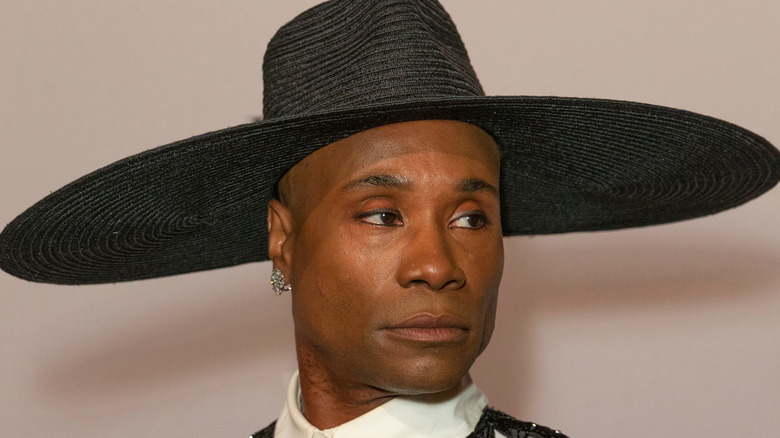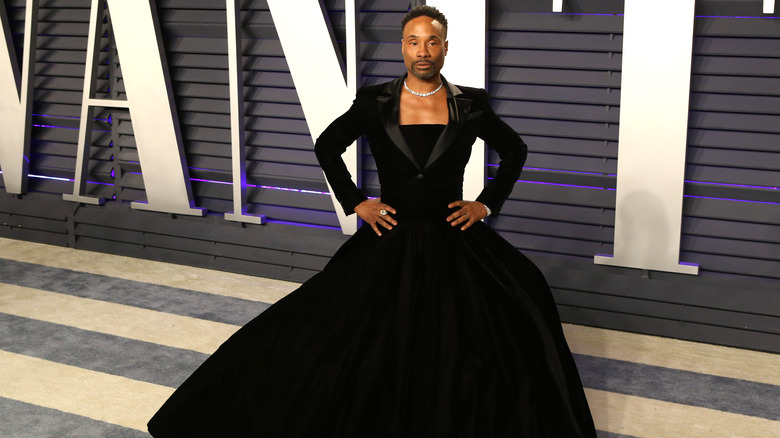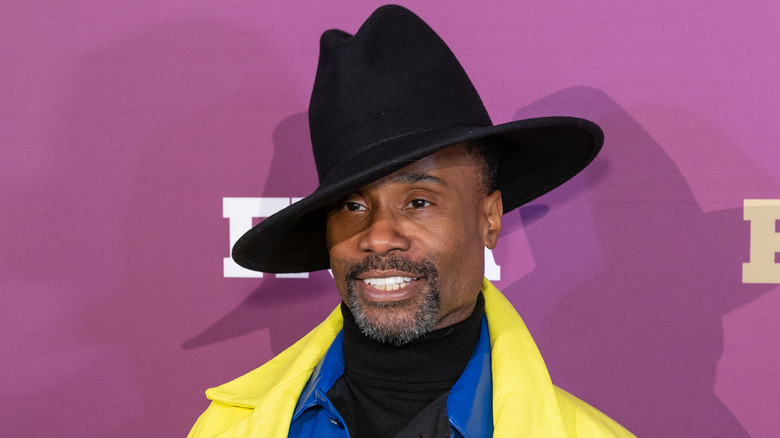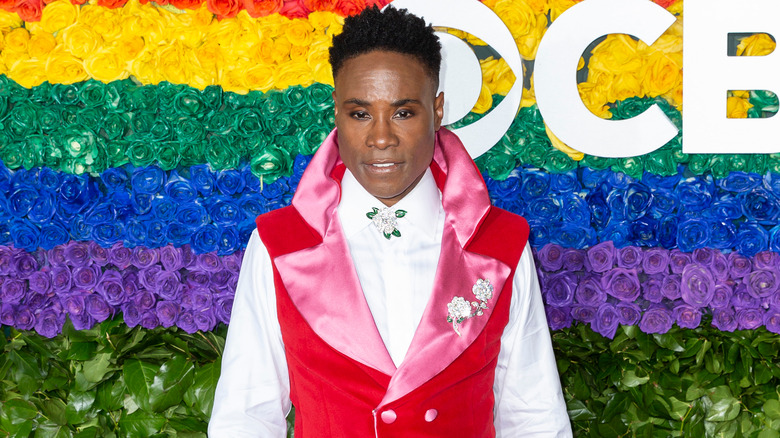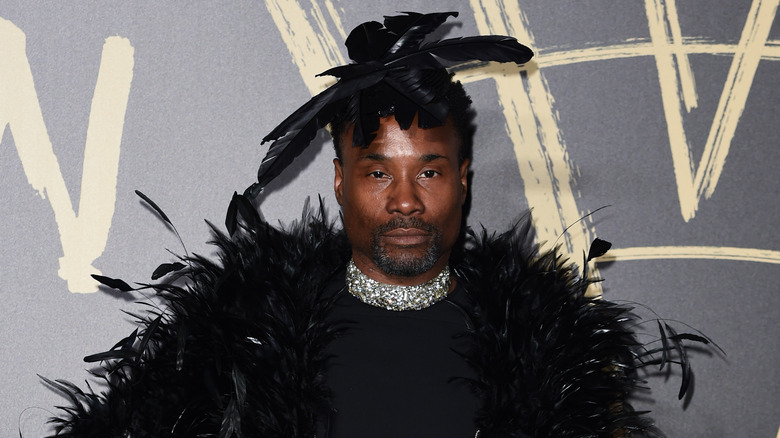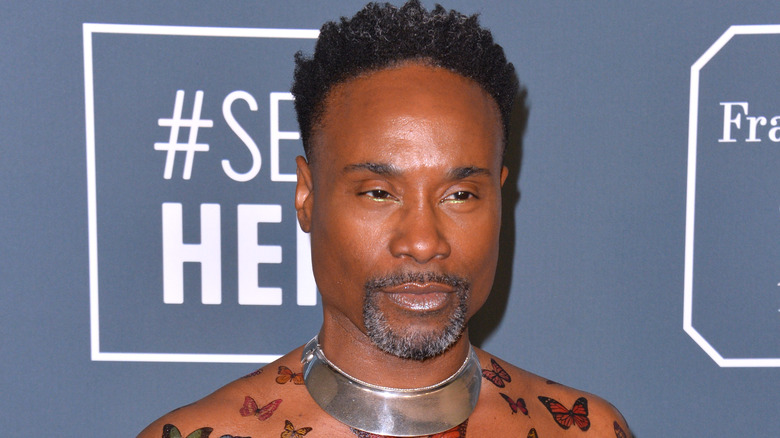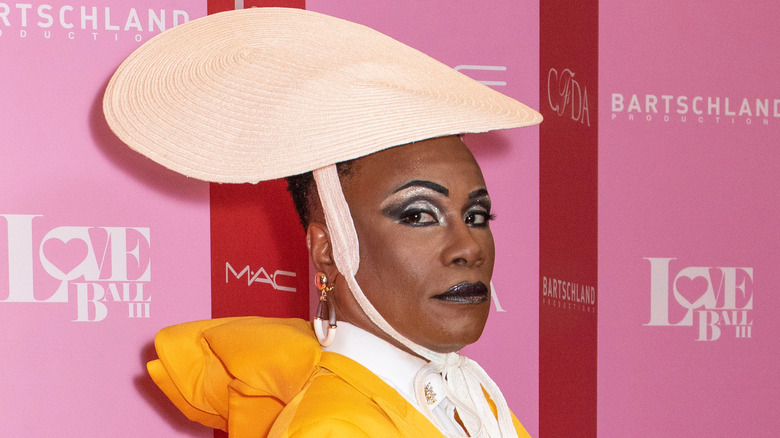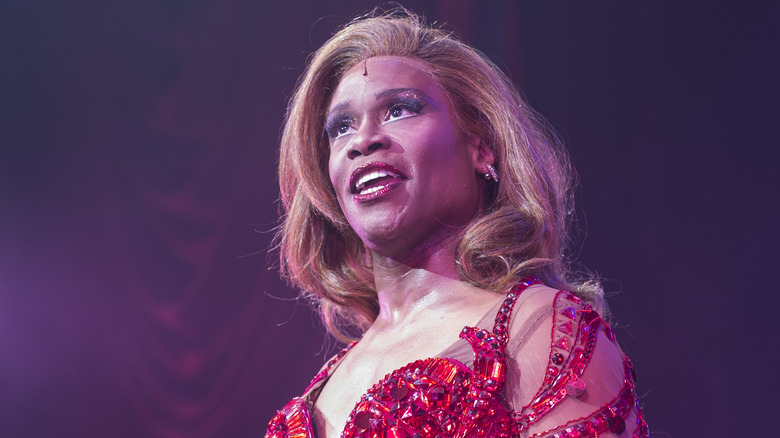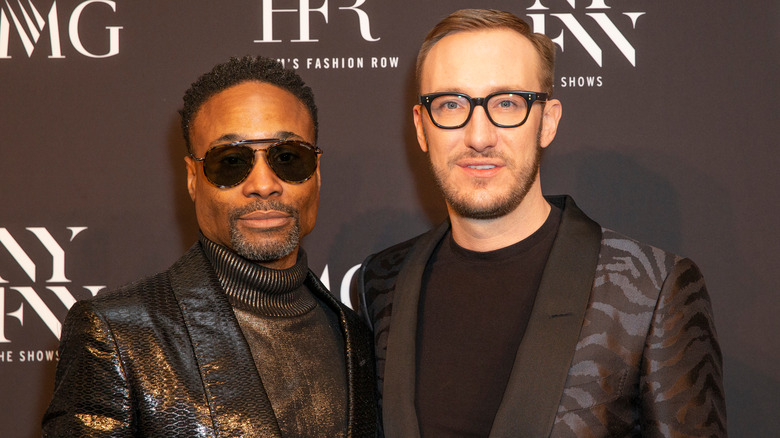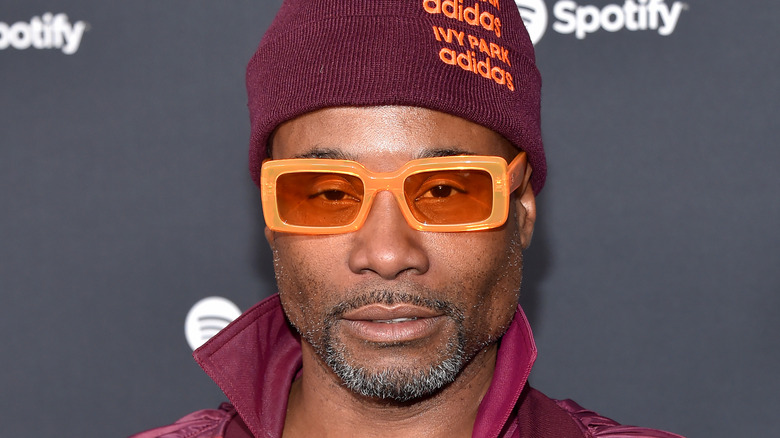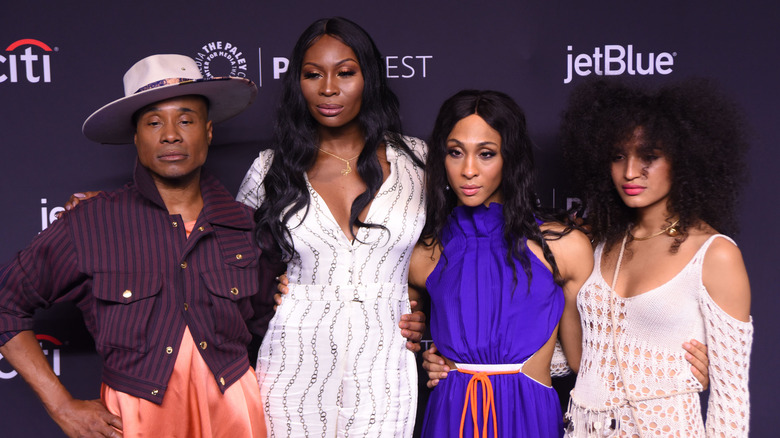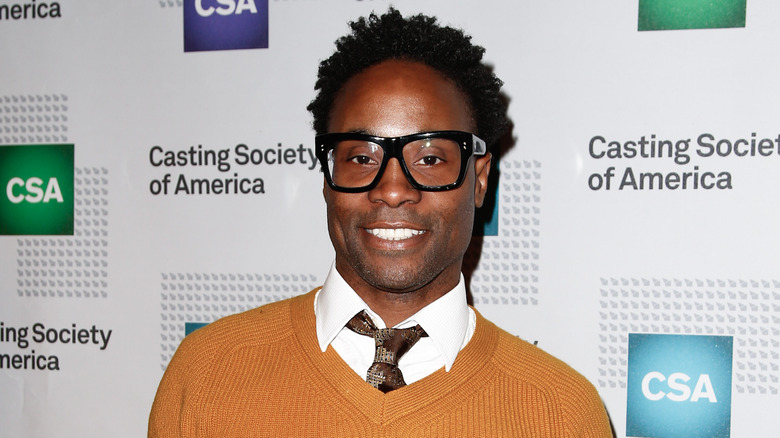Tragic Details About Billy Porter
This article contains discussion of child sexual assault.
The late 2010s were just the start of the era of Billy Porter. The TV actor and Broadway performer has made waves not only through his excellent work in "Pose," "Kinky Boots" and "American Horror Story," but also through his bold and unforgettable red carpet fashion and his willingness to speak up on the issues that matter most to him. As it turns out, those two things are inextricably linked: Fashion is a tool for him to get important messages across. "My goal is to be a walking piece of political art every time I show up," Porter told Vogue in 2019. "To challenge expectations. What is masculinity? What does that mean? Women show up every day in pants, but the minute a man wears a dress, the seas part."
Porter has evolved into a true inspiration for legions of fans, but his life hasn't always been so uplifting. The actor has withstood more than his fair share of tragedy ever since he could remember, and has captured hearts with his openness and bravery in sharing the more difficult aspects of his life with the world. All of this culminated with a beautifully candid Hollywood Reporter as-told-to piece, in which Porter opened up like he never had before. We walk you through some of the most tragic moments of the actor's life through his own words.
Billy Porter endured horrific abuse as a young child
Billy Porter was dealt a bad hand from the beginning. He grew up in Pittsburgh, Pennsylvania with his mother, sister, and stepfather, and the latter "groomed" him from an extremely young age, and sexually abused him for five years. In a heart-wrenching op-ed for Out, Porter recalled the moment he told his mom about the abuse, on a day when he was performing in a series of shows as a teenager. "She believed me but she stayed with him," Porter wrote. "I was testing her, I guess? To see if anybody could take care of me. Would there being [sic] any consequences for the damage he had inflicted. Would there be any reckoning?"
But Porter didn't let this horrific experience, which has haunted him ever since, keep him down. "[T]he sexual abuse that I received at the hands of my stepfather from the time I was seven until the time I was twelve, weirdly, was the best thing that ever happened to me," he told Esquire in 2019. Explaining what he meant by this, he continued, "At seven, at twelve, I could look around and see all of these adults with no capacity to do anything to help me. I knew there's not an adult around me that knows what the f**k to do. I will do it myself." Porter built a life for himself, on his own terms.
If you or someone you know may be the victim of child abuse, please contact the Childhelp National Child Abuse Hotline at 1-800-4-A-Child (1-800-422-4453) or contact their live chat services.
The church ostracized a young Billy Porter
Billy Porter grew up among a very religious community, and his relationship to the church was fraught to say the least. "So many people felt something special— a special energy coming from me in my life early on," Porter told Esquire about his experience giving a sermon in his church at age eleven. "And it's immediately about 'little preacher man.' You're going to be a preacher. Because it's the only space that they understand a special energy like that."
But it had been clear all along that Porter wasn't ever fully accepted there. When asked by the The Guardian about his earliest memory, the actor recalled, "Singing a solo at my Ascension Baptist church when I was five or six. There were already fears that I wasn't masculine enough. When I sang, all of the fear in the adults' eyes went away." The rejection didn't stop there, though. "When I was young, my church community said that I would never be blessed as long as I chose to be gay," Porter told the Guardian. "And we all know it's not a choice." As of May 2021, Porter considered his relationship with the church to be an "ex-relationship," as he told The Hollywood Reporter.
When Billy Porter came out, he thought he would never be allowed to be himself
Billy Porter was told in so many different ways that being gay was wrong, that being himself was wrong, but he made it to the other side, thriving in his authenticity. "This is the manifestation of the impossible," he told TV Guide in 2018 about his breakthrough role as Pray Tell on "Pose." He continued, "I came out in 1985. I never imagined in a million years it could look like this." He went on to explain that his detractors had discouraged him, told him to "adjust" his expectations, and to settle for being "a part of something else," something other than his own vision for his life. "I chose authenticity and truth and every hit that came with that," Porter told the outlet, while marveling at his unlikely success. "I'm so speechless right now. I'm just floating on air."
That word, "authenticity," lies at the heart of Porter's philosophy in its final form. "One of the most profound realizations that I've had as a 51-year-old man who is finally getting my whatever-we're-calling-this-moment-in-show-business is that I've had a lot of time to sit back and observe the lights that came before me and burned out too soon," he told The Hollywood Reporter. "I've had a lot of time to investigate why; and the answer for me always circled back around to authenticity." And that's something Porter won't compromise on.
The AIDS crisis had a tragic impact on Billy Porter's inner circle
Billy Porter moved to New York City in 1985 in a bid to kickstart his career, but sadly this coincided with the height of the AIDS crisis. Porter's community was hit hard, bringing a new wave of tragedy into the young actor's life. "I lost my first friend at 18," he told TV Guide. "By 21, I had lost more people than my grandparents had. It was devastating. It was terrifying. The idea that, not only did your love not matter, but when you found the courage to figure out how to love you could actually die from it?"
Even before his own experiences of loss within the AIDS crisis, Porter became a budding activist thanks to a friend who surreptitiously recruited him into joining a protest. During a summer trip to NYC while he was still in high school, Porter's invited him to meet up at church, where they immediately joined a Gay Pride march. "I didn't know I was going to one or knew I was going to Gay Pride, and we started walking down the street with everybody chanting, 'ACT UP, FIGHT BACK, FIGHT AIDS'," Porter told Janet Mock in Gay Times. The star said he was "completely transformed that day" and "there was no turning back."
Porter — who once told IndieWire, "My art is my activism" — considers his role on "Pose" to form part of his "healing" from the collective trauma that affected so many gay men of his generation.
Billy Porter has felt oppression 'from all sides'
Billy Porter has faced discrimination and injustice because he is Black and because he is gay. Those two parts of him exist alongside each other, and they sometimes interact in painful ways. In a video he released on Instagram in response to the murder of George Floyd, Porter describes not only fearing for his life as a Black man, but also the rejection from his own community. "And just to go even deeper," he says, "as a Black queer man in America, my basic human rights have been up for legislation every single day that I have had breath in my body, from all sides. And by that I mean that the Black community's relationship with the LGBTQ+ community is appalling at best, and eerily similar to that of white supremacists versus Black folk."
Billy Porter is deeply invested in the fight against every form of oppression. "I stand on the shoulders of my [B]lack folks who came before me and know what it feels like to be disenfranchised," Porter said in Gay Times. "It's a continued call to action for me and I hope that everybody in the LGBTQ community can come together and continue to fight for equality. I hope that's what I exude."
Discrimination in Hollywood is the norm for Billy Porter
Billy Porter has described being passed over for many roles in Hollywood because of his racial identity and sexual orientation, as well as his mannerisms. "It's a double layer, the layer of actually being a person of color in this industry, and then the other layer of being a queen," he said on Close Up with The Hollywood Reporter. "Nobody can see you as anything else. If 'flamboyantly dot dot dot' wasn't in the description of the character, no one would see me, ever, for anything — which wouldn't be so enraging if it went the other direction, but it doesn't."
His playful red carpet style is also a statement against the "status quo" in Hollywood whereby, essentially, men shouldn't wear dresses if they want to be cast. "I believe men on the red carpet would love to play more," Porter told Vogue, adding, "This industry masquerades itself as inclusive, but actors are afraid to play, because if they show up as something outside of the status quo, they might be received as feminine, and, as a result, they won't get that masculine job, that superhero job. And that's the truth. I've been confronted with that." For Porter, there is no doubt that acting is a "discriminatory profession" (via The Hollywood Reporter), but he's not about to let that stop him from living up to his full potential.
Trauma made Billy Porter the storyteller he is today
There's no denying that Billy Porter has had a difficult life and continues to face many struggles, but the actor has been able to find the silver lining in all of his experiences. "There has never been a moment that I've not been in trauma, which is what I've discovered this last year," he told The Hollywood Reporter in May 2021. "And it was my engine for a very long time. My trauma served me, my story has served me, in terms of forward motion. And as an artist, I'm grateful to have been given opportunities to work through my s**t."
Both "Kinky Boots" and "Pose" allowed Porter to work through personal issues. "I know Pray Tell becomes an activist, so we get to see that side of him," he told Esquire about his role in the TV show. "And I get to funnel my real, everyday rage into something that feels productive." Importantly, "Pose" also allows him to give a voice to marginalized communities in a way that wouldn't have been possible even just a few years ago. Speaking with IndieWire about the inexorable blend of his "art" and "activism," Porter said, "Through the decades, it's deepened. I have learned how to show up and participate better, but I don't have a choice. I'm [B]lack and gay. I don't have a choice. I can't sit back and be silent, and expect the world to do anything for me."
The heartbreaking reason Billy Porter and Adam Smith planned their wedding so quickly
There have been plenty of short engagements in Hollywood, but Billy Porter and Adam Smith are definitely up there in terms of whirlwind marriages. Unfortunately, their reason for planning a wedding at record speed wasn't all that happy: They wanted to do it before Donald Trump's inauguration, as a symbol of the uncertainty that faced the LGBTQ+ community under the new administration. "It was about making sure that that statement was made, because as gay men, we still have to be visible. We still have to show the world that this is what our love looks like; it's just like yours. We have to say that out loud," Porter told Playbill.
Porter proposed to his partner on December 29, 2016 and the two were married on January 14, 2017 in their friend's house in New York City. "We both grew up in households where who we are is labeled an 'abomination,'" Porter told People. "So to see that come around, to see that tide turned, it still takes my breath away; I'm still trying to find the words to describe it." During the pandemic, the couple moved to Long Island, and Porter has been loving the quiet. "This is the thing I didn't know I needed," he told InStyle in 2021. "I had no idea I was missing the woods, the animals, the beach, and the consistent peace. For the first time, there's no noise."
Billy Porter has lived with HIV for many years
In a beautiful as-told-to piece for The Hollywood Reporter in May 2021, Billy Porter made the courageous decision to reveal his HIV status. "I was the generation that was supposed to know better, and it happened anyway," Porter said. "It was 2007, the worst year of my life. I was on the precipice of obscurity for about a decade or so, but 2007 was the worst of it. By February, I had been diagnosed with Type 2 diabetes. By March, I signed bankruptcy papers. And by June, I was diagnosed HIV-positive."
When asked by Tamron Hall why he chose to reveal his HIV-positive status now, Porter explained that he felt "survivors' guilt," as do many "gay men of a certain age" about making it through the AIDS crisis. "Why did I survive?" he asked. "Because there's something in the survival that is greater than me. And then 'Pose' happened, and I said, 'OK, God, Universe, she, them, they, whatever we call the force, I understand, because I was left here to tell the story, to remind the world that we were here, we've always been here, we're still here, and we're not ever going anywhere.'"
Speaking to THR, Porter expressed gratitude for the medical developments that have allowed him to live with his diagnosis and maintain a thriving marriage to husband Adam Smith. "We are in a mixed-status relationship," he said. "I'm completely undetectable. That's the amazing part of the developments."
Billy Porter kept his HIV status secret from family and coworkers
Living with HIV comes with a great deal of internalized shame and stigma, and Billy Porter felt the effects of that keenly. The "Like a Boss" star kept his HIV status hidden from the public, and also from his coworkers and — heartbreakingly — his mother. When he finally decided to tell her, she was supportive and loving. "You've been carrying this around for 14 years?" she said (via The Hollywood Reporter), "Don't ever do this again. I'm your mother, I love you no matter what. And I know I didn't understand how to do that early on, but it's been decades now."
Porter describes the feeling of a weight being lifted after he shared his 14-year secret. "I feel my heart releasing," he told THR, adding, "It had felt like a hand was holding my heart clenched for years — for years — and it's all gone. And it couldn't have happened at a better time." The actor felt he owed it to all the people like his character Pray Tell on "Pose" who didn't get to survive HIV to tell his truth now. "[Pray Tell] missed the antiretroviral drugs by one year," Porter told Tamron Hall. "Pray Tell missed them and passed on, but Billy didn't." At the final season premiere for the show, Porter told Extra TV, "I am going to miss being Pray Tell, but we told the full story. He got a beginning, middle and end."
Billy Porter's mother has a degenerative disability
Billy Porter's relationship with his mother, Cloerinda Ford, hasn't always been easy. They now share a powerful bond, but Ford's health complicates things. "My mother lives in a nursing home in New Jersey," Porter told the The Guardian in 2021. "She's the love of my life, and it breaks my heart that she has a degenerative disability and can't hang out with me in person during all the success I am having now."
Ford has lived with this condition since birth, a result of a result of "medical malpractice," as Porter told Out in 2018. "We should be millionaires but this was America in the '40s ... Black. Poor. Nobody cared. Still don't. But I digress." He also revealed that before his father abandoned the family, he was physically and emotionally abusive to his mother. "He told the neighborhood that she was a witch, that's why she had a compromised gait."
For Porter, Ford's strength in the face of adversity has been a never-ending source of inspiration. "My mother is my hero," he once told W, adding, "The world told her she wouldn't ever be able to do anything. I sat and watched her get out of bed every day and show up for her life every day. It really empowered me. It gave me that kind of tenacity to never give up."

